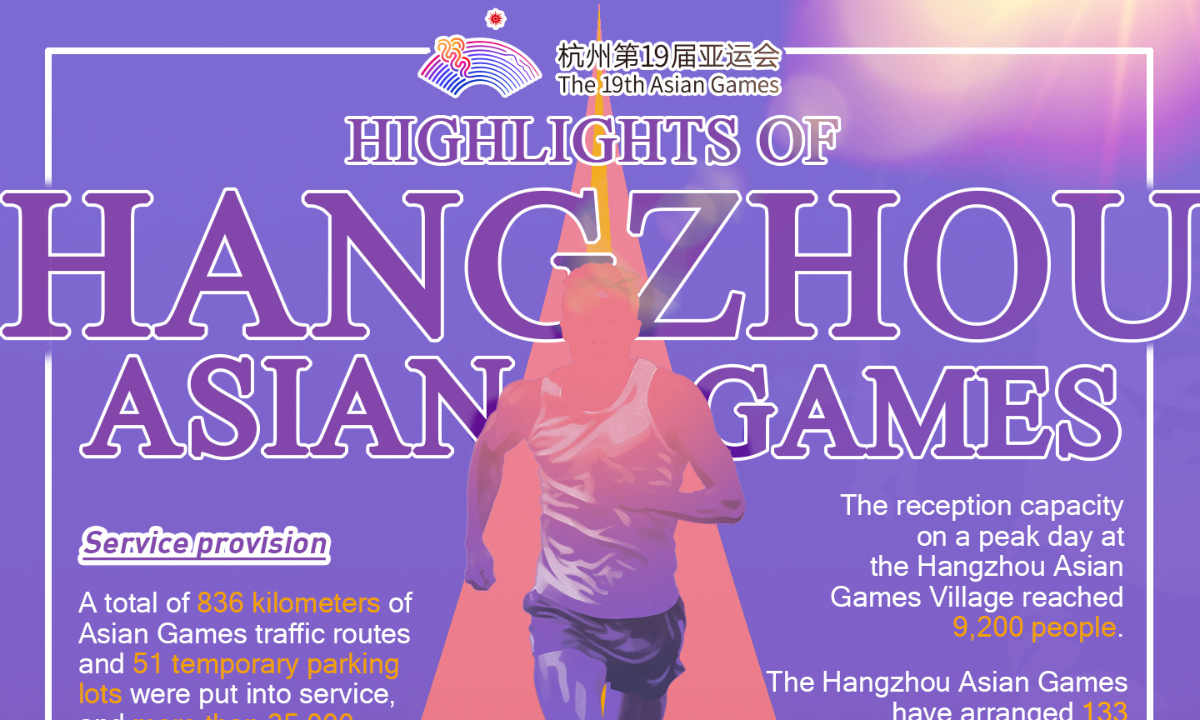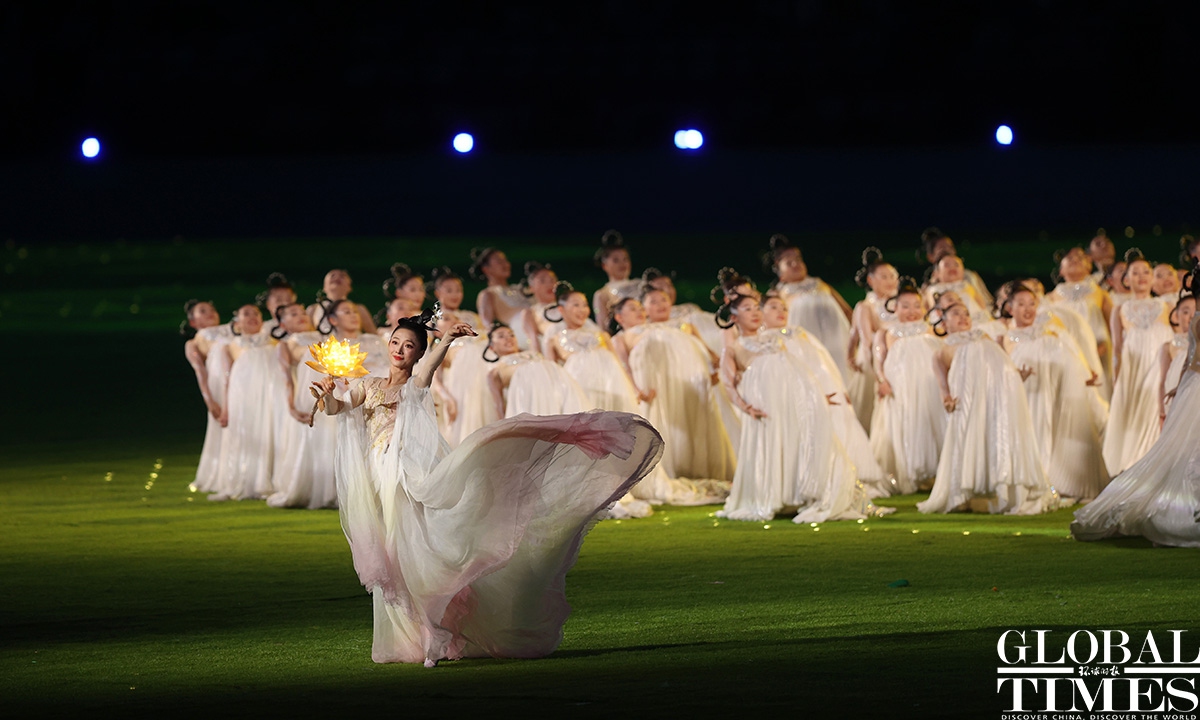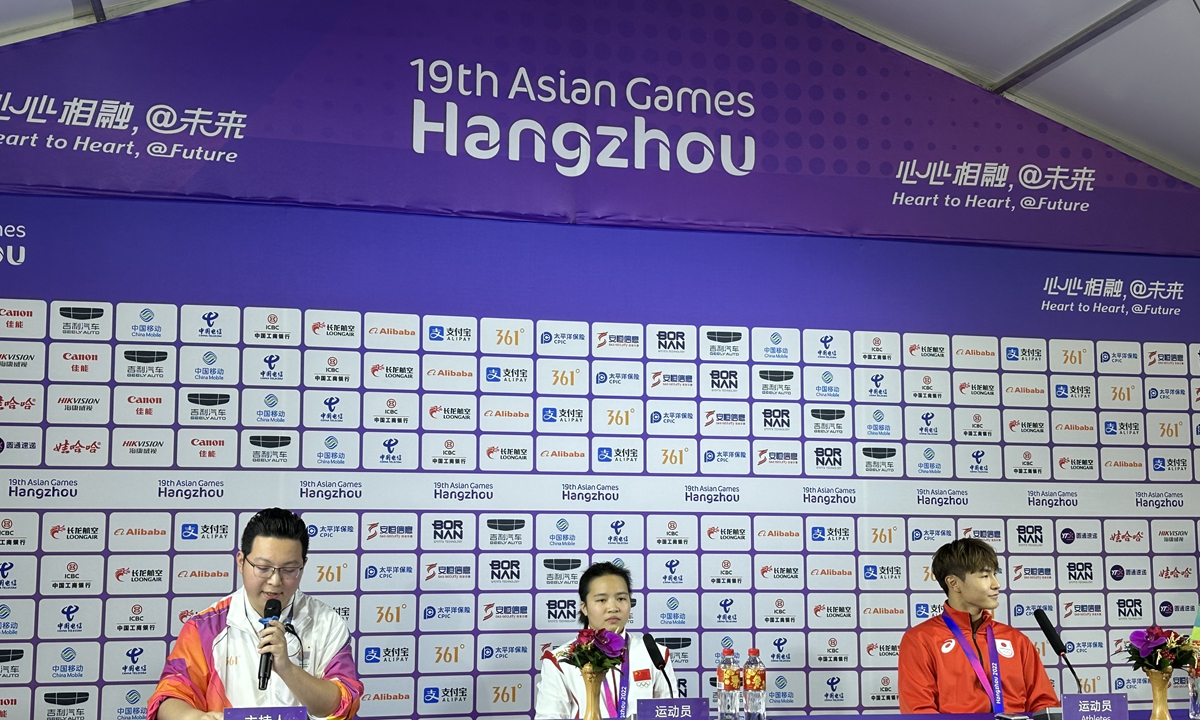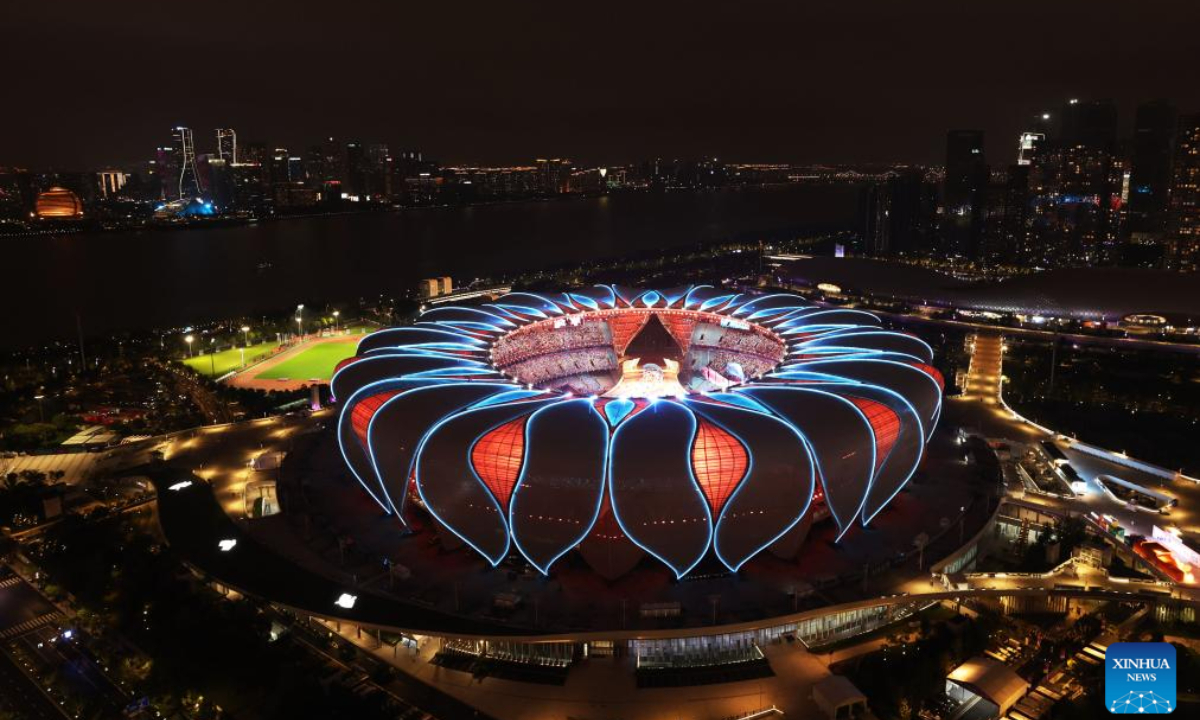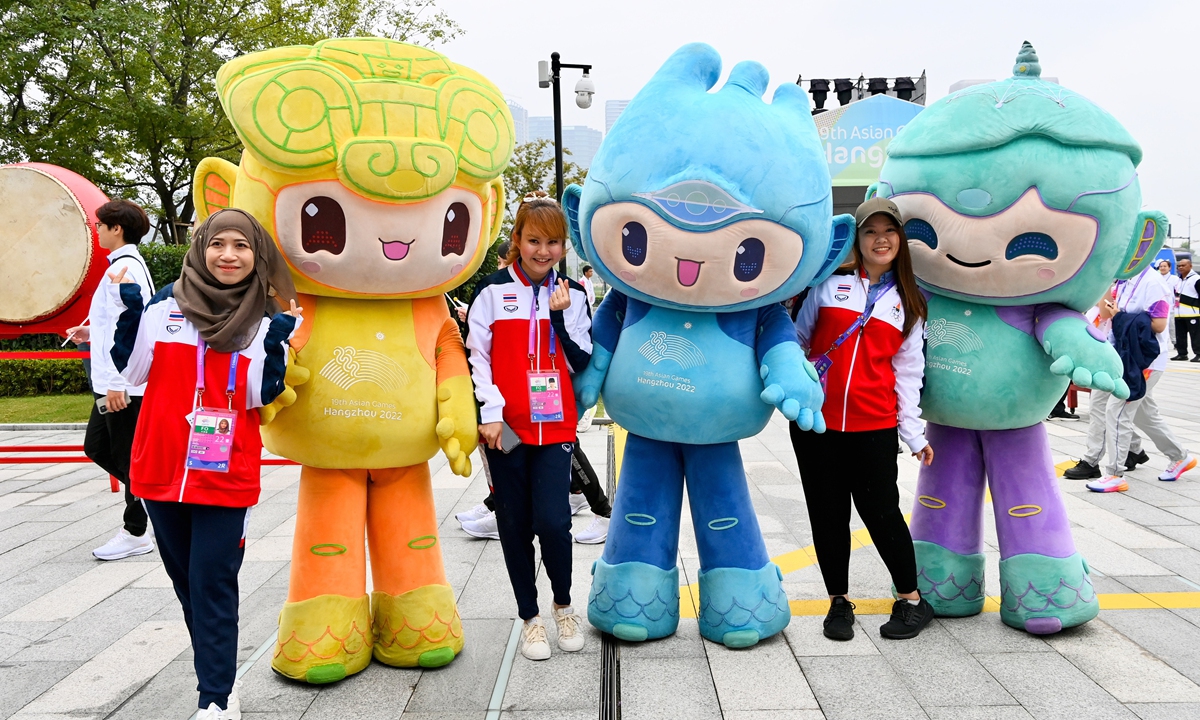Waving goodbye to a fairy-tale Asian Games in Hangzhou
Asia’s spirit of independence, solidarity manifested in an open, hospitable China
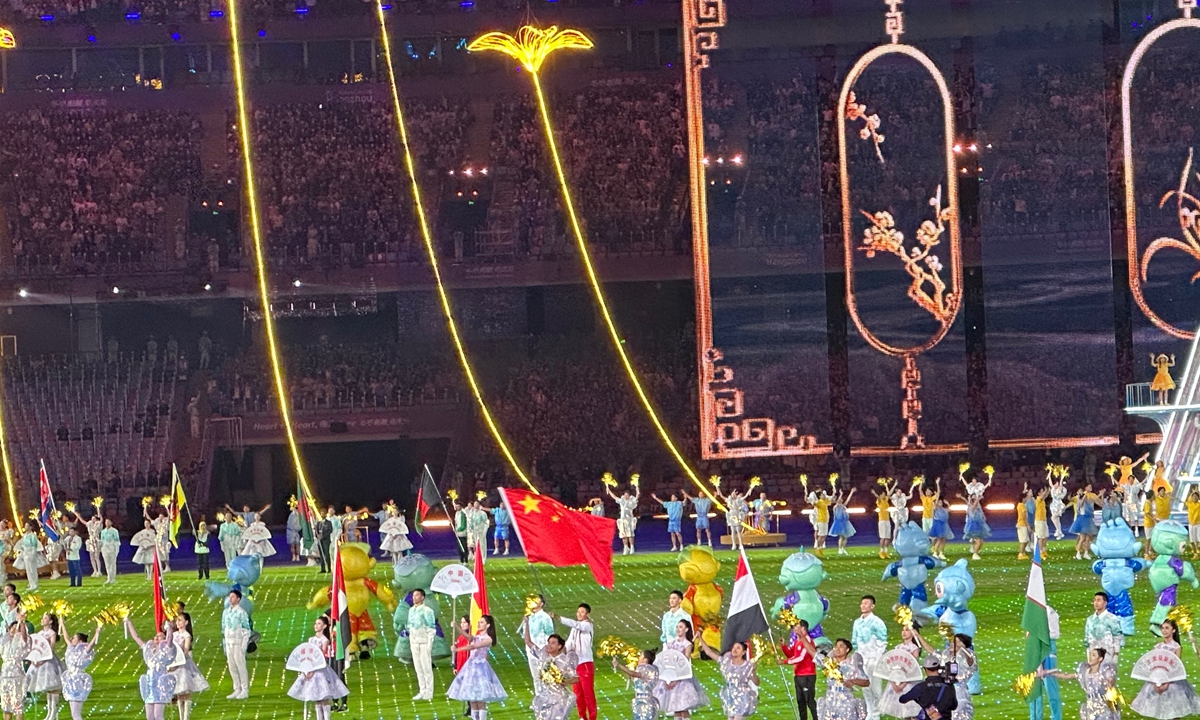
Participants perform during the closing ceremony of the 19th Asian Games at the Hangzhou Olympic Sports Center Stadium in Hangzhou, East China's Zhejiang Province, on October 8, 2023. Photo: Lin Xiaoyi/GT
Since the opening ceremony on September 23, 11,830 athletes from 45 Asian countries and regions gathered in Zhejiang to compete in 481 events in Hangzhou and neighboring cities including Ningbo, Wenzhou and Jinhua, before they gather again at the closing ceremony on Sunday night.
Themed "Enduring memories of Hangzhou," the ceremony allowed people to relive the moments of glory when athletes won the laurels, the tender farewells after countless touching moments in the competition, and the bright smiles of millions of citizens and volunteers from Hangzhou.
The closing ceremony was attended by Chinese Premier Li Qiang, and Raja Randhir Singh, Acting President of the Olympic Council of Asia (OCA).
Unlike the opening ceremony, at the closing ceremony, athletes from all delegations walked into the stadium together, mingling, regardless of nationality. They waved flags, laughed, hugged and posed for pictures while the audience applauded and cheered. No one wanted to leave the stage, but they gazed back at each other frequently before a digital torchbearer "ran" into the stadium to extinguish the cauldron, and even the avatar was reluctant to leave.
"On behalf of the Olympic Council of Asia, I offer to H.E. Mr. Xi Jinping and the people of China, to HAGOC, to the authorities of Hangzhou and co-host cities, our deepest gratitude," Singh said in his speech.
"The Asian Games Flame will soon be extinguished but the spirit of the Asian Games will continue to burn," said the OCA Acting President. "You will always be in our hearts now, and in the future!"
'One of the best ever'
At a news conference on Sunday afternoon, the official from the OCA gave the highest compliment to Hangzhou, calling it one of the best Games ever.
"Technically, we have had one of the best Asian Games ever. The standard of the Games has been very, very high," said OCA Acting Director General Vinod Kumar Tiwari on Sunday.
Over the past two weeks, many athletes, officials, staff and media reporters have expressed their praise for the Games and their admiration for Hangzhou. In terms of competition, organization, services and cultural communication, the Asian Games have undoubtedly achieved dazzling results.
"This is an Asian Games with the largest number of events, the largest number of participants, and the most complex competition organizational difficulty in the history of the Asian Games, and arguably one of the most complex comprehensive games in the world," said Zhu Qinan, spokesperson for Hangzhou Asian Games Operations Center.
During the Games, 15 world records, 37 Asian records and 170 Asian Games records were reset by top athletes.
In terms of medals, the Chinese team showed its dominance. China not only topped the gold medal table for the 11th consecutive time, but also won more than 200 gold medals at an Asian Games for the first time. Japan and South Korea were second and third in the medal table.
What is more noteworthy is that many delegations made historic breakthroughs in some traditionally weaker events, breaking the monopoly of strong teams. Other regional sports have also come to the attention of more people through the Asian Games, such as kabaddi and sepaktakraw.
A large number of spectators in Hangzhou had the pleasure of witnessing the record-breaking feats, as the Hangzhou Asian Games Organizing Committee (HAGOC) saw skyrocketing ticket sales.
"More than three million tickets were sold, generating more than 600 million yuan ($85 million) in ticket sales," said Mao Genhong, Hangzhou Asian Games Chief spokesperson. "Audience attendance exceeded 92 percent, with the largest attendance of 290,000 spectators on October 1."
Beyond the races and events, Hangzhou offered a wonderful gathering. The standards of the Asian Games Village and catering services were widely praised by athletes. Almost every athlete mentioned their admiration for the accommodation and restaurants when talking with the Global Times. In addition, the competitors spoke highly of the atmosphere and the sportsmanship among the athletes.
Margielyn Didal from the Philippines told the Global Times that she was impressed by the facilities, catering as well as the warm welcome in Hangzhou. "The venue is overwhelming. Since we arrived here in Hangzhou, everyone is always cheering you. It's exciting to see the people welcoming you," she said.
"The Asian Games in Hangzhou was very well organized and the hospitality of the people of Hangzhou was very pleasant to me," Afghan cyclist Yuldoz Hashimi told the Global Times, saying that representing Afghan women at the Asian Games has long been her dream.
Yasodara Dunuwille Koralege, a journalist from Sri Lanka, told the Global Times on Sunday that she felt the organization of the Games was really good. "Everything was very convenient for us. It was very easy for us to move around and work here. And the volunteers and everyone here was so friendly. It was a real nice event."
"When I return to Sri Lanka, I'll tell my friends and family about my experience in China," she said.
At the same time, this Asian Games impressed the public in terms of the display of advanced technology and sustainable development.
Dubbed the first "cloud Asian Games," where 100 percent of the core system was supported by a cloud network, technology made the biggest difference in carrying out the Games. "That means everything is faster - it takes a mere five seconds from real-time competition for the score to be reflected on the system, for instance," said Xu Weihua, Director-in-charge of Information Technology Command Center.
Hangzhou also prioritized sustainability. In a city that has never hosted a multi-sports event, Hangzhou only built 12 new venues, all in line with sustainable development practices.
"In construction, maintenance and use we have used a green and low-carbon approach, including in the final dismantling of temporary facilities, taking into account environmental protection," Mao said. "We have used our craftsmanship for the development of Hangzhou to make the city greener."
HAGOC said the city will strive to host more future national and international sporting competitions, but currently has no plan to bid for an Olympic meet.
Asia's unity demonstrated
At such a fairy-tale gathering, the spiritual power of Asia was once again promoted. At the same time, China's internationalization and openness were on display, observers noted.
"The spiritual strength of the Asian Games is Asian solidarity, which is the independent manifestation of the Asian spirit," Zhang Yiwu, a professor at Peking University, told the Global Times.
Zhang noted the importance of Asian sports events promoting this unity. As the world is now characterized by many divisions and conflicts, it is crucial for Asia to be united and to be friendly with each other, which is promoted by the Games itself.
In this universal context, humanity needs to be more united and needs to continue to move forward, and the Beijing Winter Olympics and the Hangzhou Asian Games demonstrated the spirit of this, Sun Jiashan, a researcher at the Chinese National Academy of Arts, told the Global Times. "It is reflected in China's pursuit of greater openness, further globalization and opposition to conservatism in culture and sports."
As an event transcending sports, the Asian Games showcased China's internationalization and openness, as well as its strong interest in the outside world.
The Western camp has deliberately smeared in the court of public opinion in recent years that China is becoming closed, but at the Asian Games, the world could clearly see the openness, optimism and self-confidence of Chinese society, contrary to the rumors, Zhang said.
